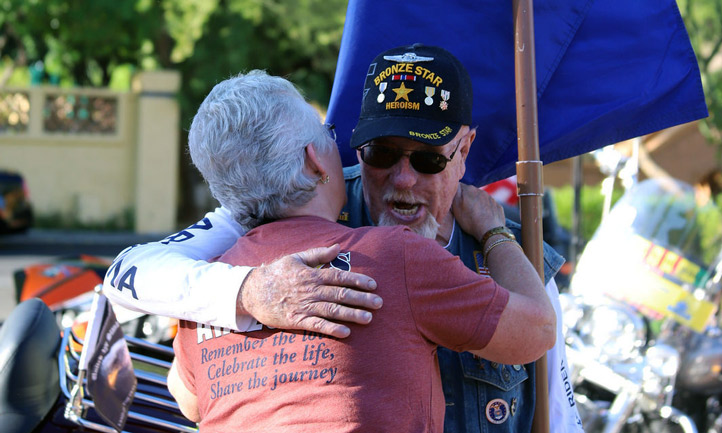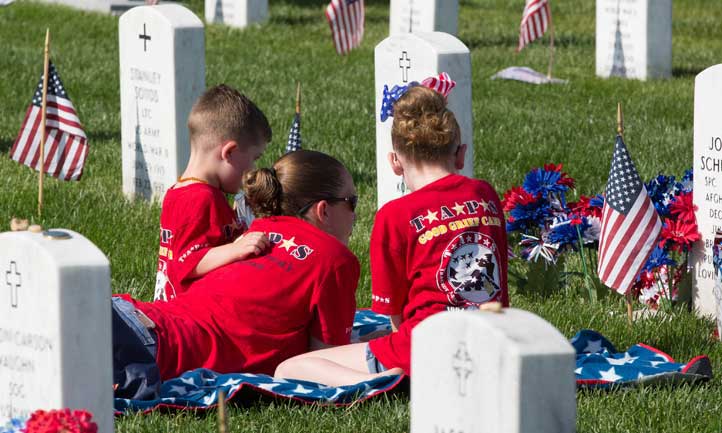Saturday Morning Message: Paying Respects
Author: Carol Lane

Good morning,
While reading the latest TAPS magazine, I came across an article titled “The Love Languages of Grief” written by Alan D. Wolfelt, Ph.D. In it, he lists the five primary ways from Gary Chapman’s book “The Five Love Languages” that help us feel loved. When a friend has a loved one die, this article can help us know what to do to make him or her feel our care. The responses this week show what survivors do differently now that they have experienced a close loss. I know since the death of my son, I think about calling the bereaved a few months after the death and sharing stories about their loved one. I spend more time touching base with others and letting them know I am really here for them. Enjoy reading the responses that came in this week.
If you would like to send a message thanking one or all of those who wrote this week, send it to me and I will make sure your thoughts are passed along to them.
Hugs,
Carol, surviving mother of Bryon
Question for Next Week’s Saturday Morning Message
Many people find that gardening helps them cope with the loss of a loved one. Perhaps it is the participation in the cycle of life, perhaps the quiet and contemplative work involved, perhaps the memory of someone else who enjoyed planting and tending flowers or vegetables. This week’s question is: Has gardening helped you mourn your loss and heal? And if so, what do you plant and why? Feel free to send photos as well. Looking forward to your responses.
Song for the Week
Dalton, father-in-law of Cory, sent the song this week. The song, by country singer and songwriter George Jones, is called "Who’s Gonna to Fill Their Shoes." The song is about how some country music legends are irreplaceable, just as our loved ones can’t be replaced.
Answers from Survivors
Last Week's Question: How do you pay respects to other folks after the death of their loved one — is it any different now than before your own loss?
From Pinita, wife of Stephen: Transformation through tragedy is something I know all of us have experienced, in so many profound ways. I actually just experienced a close friend losing a loved one this past weekend. And right away I knew he needed to know that people were listening and acknowledging his loss. But also that as a friend who was there for him, he didn't have to respond, not then, or ever. I knew that if he didn't respond it wasn't because of me, it was because he needed to deal with his loss on his own terms. We all deal with the rawness and numbness in our own ways.The tears may not flow immediately, and that does not signal lack of emotion. Or even if the tears do freely flow right away, it does not necessarily signal any other type of emotional imbalance. I've learned through my own tragic loss — losing my husband and soul mate — that the best thing I can do for another is just be a friend, even if it's a text message, a meal delivery, walking their dog, or even making a bed. And don't stop a few weeks out after the loss.The grief is still there. So continue to be a friend. This was something I profoundly learned. You don't get over the grief, but you get through it, so continue to say his or her name, recount fun stories, and keep them alive through beautiful memories.
From Linda, mother of Gene: So many folks tried to offer me comfort after the loss of my son, Gene. Some of the statements that were made actual caused me pain or even made me angry. I will always remember two statements: the one that made me angry was a lady telling me about the loss of her cat and it was the same as my loss of my child. But the one that helped and is the only statement I say to anyone at a time of loss now "I will pray for God to give you peace and comfort." To this day those words help me. For peace and comfort was what I needed most.
From Lonnie, wife of Larry: The one thing I’ve learned from this experience is that when you give your condolences to someone after their loved one has passed, do NOT ask questions about how they passed. I think I taught a former work colleague a big lesson there. I tend to be “too nice” and will answer questions, but I finally had to put a stop to it during this one conversation and tell that person what it was doing to me emotionally. I also learned a lesson for myself there as well: I need to protect myself and my privacy because answering those questions besides making me relive and remember everything, also makes me feel spent and exhausted.
From Sheryl, mother of Adam: Since I have lost my husband and son, Adam, I have become much better at sending cards to others who are experiencing loss. I also gift a daily meditation book to close family members and friends.This summer I will start to make dragonfly mobiles from spoons to give to people. In other words, I have learned how important it is to let people know that they are not alone.
From Merry, mother of Wesley: I always try to send a card.I received so many cards when Wes died and they are so very special to me. If I know the person well, I will write something inside about the deceased. Otherwise, I make reference to how many people are caring about the survivors.
Bonnie Jo, mother of Andrew and widow of Bob: Before the loss of my son, I would have never brought up the subject of loss to acquaintances I knew on a weekly or another basis. Now, I do in conversation, on the phone or in person depending on the situation.
This becomes complicated, but I allow my inner self to dictate how much I contribute and how that person seems to be responsive to it. Often, I have met or spoke with folks who NEED to also speak about their own tragedies and grief experiences. It is so rewarding to listen to them and share the journey.
I recently went to a store and I needed help bringing out the big box of stuff I bought. The checkout woman whom I have known for a while asked me why I was using a walker. We were speaking about carrying out big boxes. I told her I had twins and the carrying of them sometimes was a true challenge for sure! She asked me how old they were. I told her I only had one left as Andy had been killed in Afghanistan. Then she told me a story about her brother who died two years earlier of cancer that had invaded his whole body. I just listened (as a TAPS mentor or other would do). You know what? She will continue to be a friend of mine because she shared and so did I.
Life for us survivors is so hard, but there are so many others out there who also have lost loved ones for so many reasons. To me, the reason hardly matters. Be there for others and share when you find the opportunity. Life and death have no parameters, genders or affiliation with any job or service.
Would you like to share a question or read how other survivors respond to a topic or question you have? I would love to gather some thoughts for future Saturday Morning Messages. You can also submit favorite songs that are meaningful to you. It can be helpful to read and hear how others cope. I encourage you to reply to the Saturday Morning Message by emailing online@taps.org. I directly receive all responses that are sent to this address. In order to have your reply included in the next week’s message, it is best to send your answers to me by Tuesday of the following week.

